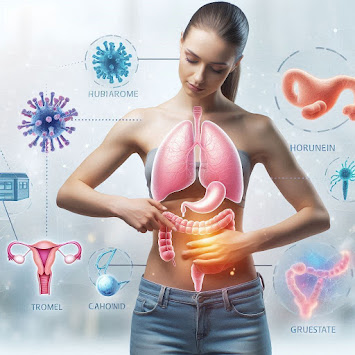Search This Blog
Your go-to resource for gut health, hormone balance, and natural wellness solutions. Learn science-backed strategies for digestive health, post-antibiotic recovery, and optimal performance.
Featured
- Get link
- X
- Other Apps
The Gut-hormone Connection: New Insights into PCOS and Women's Health
Scientists are uncovering more about how gut bacteria affect women's hormones, especially in conditions like Polycystic Ovary Syndrome (PCOS). This is an exciting area of research because it suggests that balancing gut health could be a key part of managing hormone-related issues.
What We Know About the Gut Microbiome and PCOS
PCOS affects about 8-13% of women of reproductive age and is linked to hormonal imbalances, insulin resistance, and fertility struggles. Recent studies have found that women with PCOS have a different mix of gut bacteria compared to those without the condition.
1. Imbalanced Gut Bacteria in PCOS
Research has confirmed that women with PCOS have fewer types of gut bacteria and an altered balance of certain species. A study in the Journal of Clinical Endocrinology & Metabolism found that PCOS patients had lower microbial diversity.
2. Gut Bacteria, Inflammation, and Metabolism
A 2023 study in Nature Communications showed that gut bacteria play a role in insulin sensitivity and androgen metabolism—both major factors in PCOS. The wrong balance of bacteria may contribute to inflammation and metabolic problems.
3. Key Bacteria Linked to Hormonal Health
Scientists are paying special attention to certain bacteria that may influence hormones:
Akkermansia is linked to better metabolism.
Bifidobacterium is associated with lower inflammation.
Christensenellaceae may play a role in metabolic and hormonal regulation.
Why Scientists Are Interested in Christensenellaceae
The Christensenellaceae family of bacteria has caught researchers’ attention because of its potential impact on health.
- It was first discovered in 2012 and is linked to a lower body mass index (BMI).
- Studies show it may be inherited, meaning genetics partly control its levels.
- It’s found in lower amounts in people with obesity and inflammatory gut conditions.
Early research suggests it may influence hormone regulation, but more studies are needed.
Although it’s too soon to say that increasing Christensenellaceae can dramatically change hormones, studies suggest it might help through:
- Supporting bile acid metabolism
- Producing short-chain fatty acids that benefit the gut
- Reducing inflammation, which affects hormone signaling
- Potentially interacting with the hypothalamic-pituitary-adrenal axis (a key hormonal system)
How to Support Your Gut for Hormonal Balance
While research is still evolving, there are practical ways to support gut health that may also benefit hormones.
What to Eat
- Prebiotics: Foods like green bananas, cooled potatoes, and legumes help feed good bacteria.
- Polyphenols: Found in berries, pomegranates, and green tea, these plant compounds support gut diversity.
- Fiber from Different Sources: Eating a variety of plant-based foods encourages a healthy gut microbiome.
- Fermented Foods: Yogurt, kefir, and sauerkraut introduce beneficial bacteria into the gut.
Lifestyle Habits That Help
- Managing Stress: Chronic stress harms gut bacteria. Meditation, yoga, and good sleep can help.
- Exercise: Regular movement promotes gut diversity.
- Time-Restricted Eating: Some studies suggest that intermittent fasting can benefit the gut.
- Avoiding Gut Disruptors: Limiting exposure to antibiotics and harmful chemicals helps maintain a healthy microbiome.
What’s Next for Gut Health and Women’s Hormones?
This area of research is still growing, but in the future, we can expect:
1. More clinical trials testing how specific bacteria affect hormones
2. Personalized treatments targeting the gut to help manage PCOS
3. A better understanding of how diet, genetics, and bacteria interact
4. Improved ways to test gut health in relation to hormonal issues
Final Thoughts
The connection between gut health and hormones is a fascinating and promising field. While it’s important not to jump to conclusions, early research suggests that caring for your gut might also support hormonal balance. As new studies come out, we’ll likely see more precise recommendations for conditions like PCOS.
Disclaimer: This is for educational purposes only and not medical advice. Always talk to your doctor before making health changes, especially if you have a medical condition or take medication.
References
1. Qi X, et al. (2023). Gut microbiota-bile acid-interleukin axis in polycystic ovary syndrome. Microbiome, 11(1), 25.
2. Torres PJ, et al. (2022). Gut Microbial Diversity in Women with Polycystic Ovary Syndrome Correlates with Hyperandrogenism. Journal of Clinical Endocrinology & Metabolism, 107(9), 2562-2574.
3. Waters JL & Ley RE. (2021). The human gut bacteria Christensenellaceae are widespread, heritable, and associated with health. BMC Biology, 19(1), 84.
4. He F & Bonder MJ. (2023). Causal relationships between gut microbiome and polycystic ovary syndrome: A mendelian randomization study. European Journal of Epidemiology, 38(4), 433-445.
5. Baker JM, et al. (2022). Estrogen-gut microbiome axis: Physiological and clinical implications. Maturitas, 158, 45-59.
- Get link
- X
- Other Apps
Popular Posts
The Gut-Hormone Connection: How Your Gut Controls Your Estrogen Levels
- Get link
- X
- Other Apps


Comments
Post a Comment